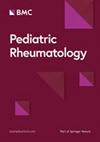Effect of exercise training on heath, quality of life, exercise capacity in juvenile idiopathic arthritis: a meta-analysis of randomized controlled trials
IF 2.8
3区 医学
Q1 PEDIATRICS
引用次数: 0
Abstract
Little is known about the efficacy and safety of exercise training on juvenile idiopathic arthritis (JIA). This study aims to investigate the effect of exercise on health, quality of life, and different exercise capacities in individuals with JIA. A comprehensive search of Medline, Embase, Web of Science, and the Cochrane Library was conducted from database inception to October, 2023. Included studies were randomized controlled trials (RCTs) reporting the effects of exercise on JIA patients. Two independent reviewers assessed the literature quality using the Cochrane Collaboration’s risk of bias tool. Standardized mean differences (SMD) were combined using random or fixed effects models. The level of evidence was assessed using the Grading of Recommendations Assessment, Development, and Evaluation (GRADE) approach. Five RCTs met the inclusion criteria, containing 216 female participants and 90 males. The meta-analysis results showed that exercise had no significant effect on JIA patients based on the Child Health Assessment Questionnaire (CHAQ) (SMD=-0.32, 95%CI: -0.83, 0.19; I2 = 73.2%, P = 0.011) and Quality of Life (QoL) (SMD = 0.27, 95%CI: -0.04, 0.58; I2 = 29.4%, P = 0.243) and no significant effect on peak oxygen uptake (VO2peak). However, exercise significantly reduced visual analog scale (VAS) pain scores in JIA patients (SMD = 0.50, 95%CI: -0.90, -0.10; I2 = 50.2%, P = 0.134). The quality of evidence assessed by GRADE was moderate to very low. Exercise does not significantly affect the quality of life and exercise capacity in JIA patients but may relieve pain. More RCTs are needed in the future to explore the effects of exercise on JIA.运动训练对幼年特发性关节炎患者的健康、生活质量和运动能力的影响:随机对照试验的荟萃分析
人们对运动训练对幼年特发性关节炎(JIA)的疗效和安全性知之甚少。本研究旨在调查运动对幼年特发性关节炎患者的健康、生活质量和不同运动能力的影响。从数据库建立到 2023 年 10 月,我们对 Medline、Embase、Web of Science 和 Cochrane 图书馆进行了全面检索。纳入的研究均为报告运动对 JIA 患者影响的随机对照试验 (RCT)。两名独立审稿人使用 Cochrane 协作组织的偏倚风险工具对文献质量进行了评估。使用随机或固定效应模型合并标准化均值差异(SMD)。证据等级采用建议评估、发展和评价分级(GRADE)方法进行评估。五项研究性试验符合纳入标准,其中包括 216 名女性参与者和 90 名男性参与者。荟萃分析结果显示,根据儿童健康评估问卷(CHAQ)(SMD=-0.32,95%CI:-0.83,0.19;I2=73.2%,P=0.011)和生活质量(QoL)(SMD=0.27,95%CI:-0.04,0.58;I2=29.4%,P=0.243),运动对JIA患者没有显著影响,对峰值摄氧量(VO2peak)也没有显著影响。然而,运动能明显降低JIA患者的视觉模拟量表(VAS)疼痛评分(SMD = 0.50,95%CI:-0.90,-0.10;I2 = 50.2%,P = 0.134)。GRADE 评估的证据质量为中等至极低。运动对JIA患者的生活质量和运动能力没有明显影响,但可以缓解疼痛。未来需要更多的研究性试验来探讨运动对JIA的影响。
本文章由计算机程序翻译,如有差异,请以英文原文为准。
求助全文
约1分钟内获得全文
求助全文
来源期刊

Pediatric Rheumatology
PEDIATRICS-RHEUMATOLOGY
CiteScore
4.10
自引率
8.00%
发文量
95
审稿时长
>12 weeks
期刊介绍:
Pediatric Rheumatology is an open access, peer-reviewed, online journal encompassing all aspects of clinical and basic research related to pediatric rheumatology and allied subjects.
The journal’s scope of diseases and syndromes include musculoskeletal pain syndromes, rheumatic fever and post-streptococcal syndromes, juvenile idiopathic arthritis, systemic lupus erythematosus, juvenile dermatomyositis, local and systemic scleroderma, Kawasaki disease, Henoch-Schonlein purpura and other vasculitides, sarcoidosis, inherited musculoskeletal syndromes, autoinflammatory syndromes, and others.
 求助内容:
求助内容: 应助结果提醒方式:
应助结果提醒方式:


